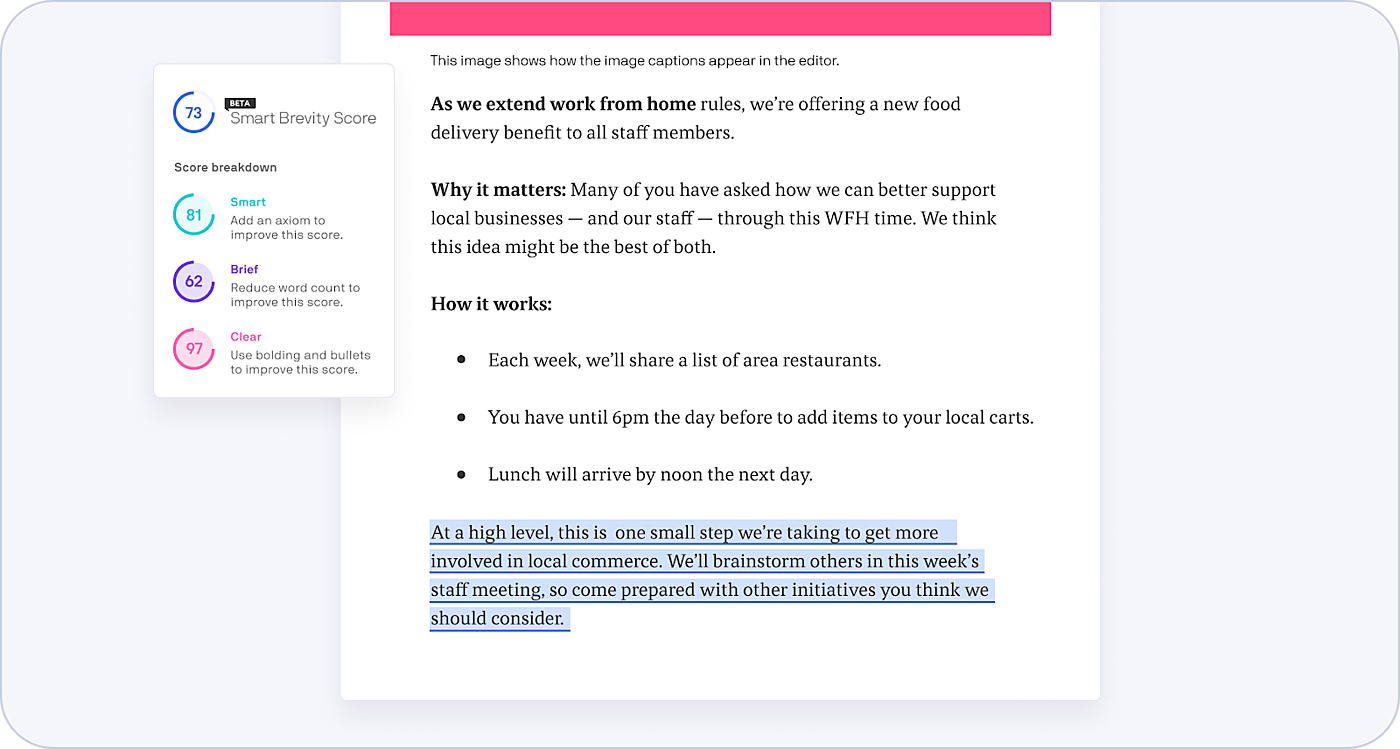
It’s Wednesday morning! Time to grab a cup of coffee and put on your shorts :)
This week we explore the strategy behind:
- Axios’s new software business
- WarnerMedia’s sale of Crunchyroll (a seemingly perfect fit for HBO Max)
- Twitter’s video shakeup (killing Periscope and acquiring Squad)
Enjoy!
(And don’t forget to click the feedback thingy at the bottom 🙏)
Axios’ foray into software — perplexing 🤨
What happened?
- Axios announced they’re building a newsletter creation tool for internal emails, called “Axios HQ.”
- It’s targeted at big companies who need to write internal newsletters that will be read by thousands of employees.
- The idea is to guide writers to use Smart Brevity®, Axios’ house style. The product features an algorithm developed for use in Axios’ own newsletters that scores writing on how smart, brief, and clear it is.
- So far, Axios HQ has had 100 beta customers and $1m in revenue.
- It looks like this:
Why? What’s the strategy?
Axios is in a strong position to do this because:
- Their ad sales team and journalists already have relationships with a big percent of the Fortune 500, so sales will be easier.
- They invented Smart Brevity, so they’ll always be seen as the authoritative guide on the topic.
- The Axios brand is powerful, which means readers of internal newsletters might be more likely to read because of it. (Unclear whether it will be branded or white-labeled, though!)
But, why build a SaaS product in the first place?
- I’m guessing that Axios wants to diversify their revenue mix away from advertising. It’s incredibly hard to compete with Facebook and Google, and advertising is highly sensitive to recessions and volatility.
- So it seems like they want to build a B2B SaaS cash cow that they can use to fund their journalism.
- Kinda like how Buzzfeed uses entertainment to fund news?
- (Except hopefully more effective!)
Will it work?
- I’m torn.
- Sure, it might be a profitable business, but is it worth diverting management attention from their core advertising business?
- Worse, I see possible conflicts. Do businesses really want to write confidential internal memos on software built by a business that has another division actively trying to unearth scoops about you?
- Then again, this is a much better move than most other media companies (Washington Post, Vox, etc) who license a vanilla CMS. At least Axios is targeting a specific problem in a larger market!
- This is a perplexing case where, even though the strategy might be iffy, good execution could make it pay off. But I’ll always wonder whether they would have been better off by focusing on their core, which seems to be just getting started.
WarnerMedia’s sale of Crunchyroll — also perplexing 😅
What happened?
- WarnerMedia sold Crunchyroll (an anime streaming service with 3m paid subs) to Sony-owned rival anime streamer, Funimation.
- The price was $1.18 billion, representing a near doubling in value since 2018, when AT&T acquired Crunchyroll.
- Sony now has the largest anime streaming business outside SE Asia by a large margin.
Why? What’s the strategy?
Will it work?
- The question when evaluating a deal like this is whether the $1.18b in cash is more valuable to AT&T than the future cash flows they could generate by owning Crunchyroll.
- To me it seems hard to believe that selling Crunchyroll is the right move.
- Anime, like gaming, is ascendant in culture. Analysts predict the market will grow by 8.8% over the next five years.
- I guess AT&T must really need that cash!
Twitter’s Periscope shutdown — overdue 🥱
What happened?
- Two big announcements from Twitter this week:
- First, Twitter is shutting down Periscope. This was discovered by Jane Manchun Wong last week, and yesterday Twitter confirmed that it is indeed happening.
- Second, Twitter acqui-hired a video chat app called Squad, which was shut down the same day their acquisition was announced. The product fits somewhere between Zoom and Periscope in terms of functionality.
Why? What’s the strategy?
- Twitter seems to have hit the "reset" button on their live video efforts.
- The question is: what was wrong with Periscope? And what is it about Squad — either the product or the team — that they think is right?
- Periscope had two big problems: 1) limiting assumptions, and 2) under-investment.
- The original inspiration for Periscope struck when founder Kayvon Beykpour witnessed protests in Turkey in 2013, and thought it might be nice if he was able to broadcast what he was seeing to the world.
- The “look at this crazy thing I’m seeing” model of livestreaming is important, but not the most common use case. A lot more people would like to just see people they like talking to each other.
- This is the limiting assumption of Periscope: that a single phone streaming is the default user experience. And this is where Squad comes in: it’s multiplayer by default. (More like Clubhouse, or Houseparty.)
- Perhaps if Periscope hadn’t been in “maintenance mode” for years. they would have discovered this a long time ago!
Will it work?
- This is especially hard to predict because we don't know what Twitter will do — they acquired a team, but they haven't announced a new product.
- But let's imagine they create something more conversational, more many-to-many, kind of like Houseparty or Clubhouse.
- It's not a stretch, given another recent Jane Wong leak, TwitterSpaces:
- So, would that work? I think the chances are good that it's at least more engaging than Periscope.
- Clubhouse recently rose to as high as #85 free app in the App Store, despite being an invite-only beta. So there’s clearly some level of demand for live conversations.
- The main question is whether Twitter will be able to handle moderation challenges. Clubhouse seems to be struggling with this, and they are a tiny fraction of Twitter's scale.
- This one is hard to predict! It’s 50-50 to me.
This edition of Three Shorts was written by me, Nathan Baschez, with help from Bryant Jefferson, Austin Langlinais, and Dan Shipper.
The Only Subscription
You Need to
Stay at the
Edge of AI
The essential toolkit for those shaping the future
"This might be the best value you
can get from an AI subscription."
- Jay S.
Join 100,000+ leaders, builders, and innovators

Email address
Already have an account? Sign in
What is included in a subscription?
Daily insights from AI pioneers + early access to powerful AI tools













Comments
Don't have an account? Sign up!